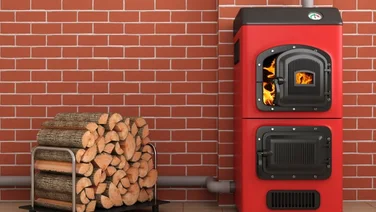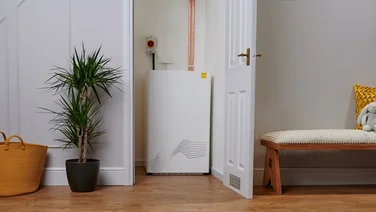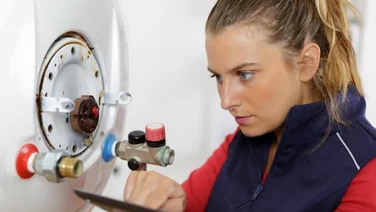We receive a small fee from trusted installers when you request a quote through our site. This helps us keep our content independent, well-researched and up to date – Learn more
- How much does a new oil boiler cost?
- Oil boiler costs by type of boiler
- What factors affect the cost of an oil boiler?
- How to reduce the cost of an oil boiler
- Are there any government grants for oil boilers?
- How long does a new oil boiler take to install?
- How long is an oil boiler’s typical warranty?
- Oil boiler running costs
- Summary
The topic of new boiler costs can be pretty overwhelming – it all depends on the type of boiler you’re after. Gas boilers account for more than 85% of UK households’ central heating, but if you live too far away from the gas grid, you probably have an oil boiler.
Around 6% of UK homes use an oil boiler, but there are still plenty to choose from.
We’ve created this page to give you an idea of what you can expect to spend on an oil boiler in 2024.
If you’re looking for a new electric boiler, you can always fill in this short form. Just put in a few details and our trusted suppliers will get back to you with bespoke quotes for you to compare.

How much does a new oil boiler cost?
A new oil boiler will cost you between £1,700 and £6,500, or £4,700 on average. The cost depends on the size of the unit, the manufacturer, and how long it takes to install. The difficulty involved in the installation can affect the price too.
Here’s a table showing what it might cost:
Read our guide on how much a new boiler might cost you to see what you might spend on other types of boilers.
Oil boiler costs by type of boiler
The type of oil boiler you get will affect how much you pay:
Combi oil boiler
Combi boilers are compact, cost-effective units that are ideal for people who want a heating system without the need for a hot water tank or cylinder.
Just turn on the tap, and a combi boiler will give you hot water, on demand. That means no waiting for your water to heat up, which is extremely convenient.
You can pick up a cheap combi oil boiler for around £1,300, but bigger and more powerful models will cost roughly £4,000 — these are designed for especially large homes.
Combi boilers are more expensive individually than system and conventional boilers, but are cheaper overall because you don’t need to purchase a separate hot water cylinder and/or cold water tank.
System boiler
System boilers take water from the mains and heat it in a hot water cylinder, unlike a combi boiler, which heats water straight from the mains.
Conventional oil boiler
Conventional oil boilers are the oldest types of boilers still around, and they require all the extra parts.
You’ll need a hot water cylinder, a cold water tank, and the boiler itself, which means they take up more space overall than the other types.
You’ll typically find conventional boilers in older properties, homes with low water pressure, and houses with more than two bathrooms.
What factors affect the cost of an oil boiler?
The cost of an oil boiler is affected by a number of factors, including the type of boiler you get, if you’re converting an existing boiler into a different type, and the labour involved to install it:
Boiler type
Whether your oil boiler is a combi, conventional, or system will affect the unit’s cost, with combi units usually being the most expensive, and system units being the cheapest.
Because combi boilers don’t need an extra water tank or cylinder however, they work out cheapest overall. That is unless you already have a water tank and/or cylinder, in which case both system and conventional oil boilers will be cheaper.
Converting a boiler
Converting your boiler to a different type of boiler will increase the cost, especially if you need to change the pipework or remove water tanks.
You’ll have to do this if you’re moving from a conventional boiler to a combi boiler, for example.
Labour
No oil boiler installation is the same, with each house presenting a slightly different challenge each time.
Your installation might need extra pipework, replacement radiators, or a new water storage tank. This all adds to the cost because it’ll take more effort — and time — to install your oil boiler.

How to reduce the cost of an oil boiler
You can reduce the cost of your oil boiler — including running costs — by making a few smart choices.
Start by planning when to buy your heating oil, because different times of the year can make the difference. Think about ordering your oil in summer as the prices for delivery are typically lower than in winter.
Don’t wait until you run out or run low on oil, either. Leaving it until the last minute means you’ll be at the mercy of your oil provider’s premium delivery prices.
Bulk buying your oil can save as much as 10% off of the total cost, according to the Citizens Advice Bureau, but this depends on whether you have a large enough tank.
Make sure you keep your boiler regularly serviced as well, because otherwise it can become less efficient over time, which’ll leave you spending more on fuel costs.
Are there any government grants for oil boilers?
There are no government grants for oil boilers, as they’re part of the government’s upcoming ban on gas and oil-powered boilers.
It’ll first be implemented in new-build homes in 2025, then in all properties by 2035. Unfortunately, off-grid homes that rely on oil boilers cannot replace one with a like-for-like oil boiler after 2026.
That leaves around 1.5 million UK households with just four years to find a proper replacement, or switch to an oil boiler capable of using LPG, or the more eco-friendly bioLPG.
What is LPG and bioLPG?
LPG is a gas in liquid form which can be used in place of oil. It’s a low-carbon, highly efficient fuel that’s collected as a byproduct of refining crude oil.
BioLPG is the same, only it’s much better for the environment, as it’s produced from organic waste, residues, and sustainably sourced materials.
Running an oil boiler with bioLPG means reducing your emissions by 38%, compared to oil. BioLPG’s downside is that it’s less efficient than both ordinary LPG and oil, so you’ll end up using more fuel for the same amount of heating.
How long does a new oil boiler take to install?
Installing a new oil boiler will take anywhere between one and three days, depending on the complexity of the job.
Living in a hard-to-reach rural location can add time to the process, especially if your property has difficulties that the installer didn’t account for.
It’s important to make sure your installer is aware of anything that might make the process more complicated. This includes the location of your oil tank, the thickness of your walls, and the type of your old boiler.
How long is an oil boiler’s typical warranty?
All oil boilers come with a standard two-year warranty, regardless of manufacturer or boiler type.
The major oil boiler manufacturers offer extended five-year warranties, and some even offer warranties of up to 10 years.
These longer warranties typically require your boiler to be fitted by an accredited installer, which means they’ve been specifically trained by the manufacturer to install its range of boilers.
Oil boiler running costs
Your annual running costs for an oil boiler will be £1,883 if you use the 17,000 kilowatt hours (kWh) that’s typical for homes heated this way.
Standard heating oil costs £0.97 per litre as of 31 October 2022, and it’s currently 11.08p per kWh based on maximum oil boiler efficiency, which is 90%.
Using LPG is cheaper at 7.08p per kWh, making your annual running cost around £1,203.
Summary
Costing £4,700 on average, oil boilers are more expensive than the typical cost of a new gas boiler, which is £4,000.
The upcoming ban on all oil boilers for off-grid homes in 2026 too means it’s important to start thinking about an alternative way to heat your home.
A major barrier to alternatives is cost, unfortunately, with green heating methods like air source heat pumps costing £10,000, on average.
You can get £5,000 off an air source heat pump with the Boiler Upgrade Scheme, but that’ll only cover 90,000 UK households.








